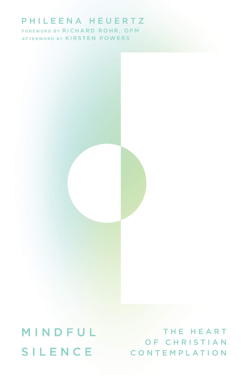
As has become a July tradition at The Well, we have the opportunity to share excerpts of a book we enjoyed this year.
We settled on Mindful Silence: The Heart of Christian Contemplation by Phileena Heuertz because of its invitation to spiritual growth through the practice of contemplative prayer. Her own experience with this practice came after years of Christian work in developing countries, and an inability to reconcile what she witnessed in the world with “what I had learned about God growing up in the Protestant pews of Indiana.” Contemplative prayer became a new way of relationship with God.
While the work to which you are called might not look like hers, might you resonate with the sense of weight of responsibility, important problems which you are not able to fully solve on your own, and a general exhaustion? This invitation to contemplative prayer offers a way forward when you’re not sure what to make of your faith anymore.
We hope the introduction to Mindful Silence is meaningful for you too. Come back each Thursday in July for another glimpse into this book!
— Andrea Bridges
Practice: Breath Prayer
by Phileena Heuertz, excerpted from Mindful Silence: The Heart of Christian Contemplation
 Christian contemplation hinges on the affirmation that by grace we are partakers in the divine nature (2 Peter 1:4). The breath prayer, like all contemplative prayer practices, helps us live into that divine nature and be a channel for love and mercy in our world.
Christian contemplation hinges on the affirmation that by grace we are partakers in the divine nature (2 Peter 1:4). The breath prayer, like all contemplative prayer practices, helps us live into that divine nature and be a channel for love and mercy in our world.
Breath prayer is an ancient Christian prayer practice dating back to at least the sixth century. Historically, it is associated with the Greek and Russian Orthodox churches, and known as the Jesus Prayer or Prayer of the Heart. Early practitioners would repeat to the rhythm of their breath the phrase, “Lord Jesus Christ, Son of God, have mercy on me, a sinner.” In time, the prayer was shortened to, “Lord Jesus Christ, have mercy” or simply, “Jesus, mercy.”
Breath prayer is an example of “praying without ceasing,” as the apostle Paul admonished us to do (1 Thessalonians 5:17), and has the potential to become as natural as breathing. It is intended to be a very short prayer of praise or petition, just six to eight syllables. The words of the prayer can be easily adjusted to your heart’s desire. Praise is expressed by invoking one of the divine names such as Yahweh, God, Jesus, Lord, Father, Mother, Christ, or Spirit on the in-breath. You may prefer another name of adoration. Your request, intention, or praise is composed of the few words following the initial divine invocation and prayed on the out-breath.
Breath prayer is usually recited silently. But some people sing it; others chant it. It’s your prayer; pray it your way. You may use breath prayer on the go or as the method for your daily spiritual practice in stillness. When praying in stillness, repeat the prayer over and over to the rhythm of your breath. Keep your attention on the words of the prayer, like a mantra. If your attention wanders, gently return to the words of the prayer. Eventually, the words may fall away, the mind becomes still, and you are brought into deeper contemplation.
Begin with five minutes and gradually increase the time to fifteen or twenty minutes as you become disciplined with the prayer. You may want to use a timer to free yourself from watching the clock. Afterward, some find it useful to write in a journal their experience with the prayer.
To begin, close your eyes and recall the line “Be still and know that I am God” (Psalm 46:10). Be still, calm, peaceful, open to the presence of God.
With your eyes closed, imagine that God is calling you by name. Imagine that God is actually asking, “(Your name), what do you want?” As with the blind man on the road to Jericho (Luke 18:35), Jesus kindly looks you in the eyes and asks, “What do you want from me?”
Give God a simple and direct answer that comes honestly from your heart. Your answer may be one word such as peace or love or help. It may be several words or a phrase such as, “Show me the way,” or “Give me peace.” Whatever your answer, it is the foundation of your breath prayer. Perhaps you simply want to praise God or express gratitude. Your prayer may be something simple like “I adore you,” or “Thank you.”
Select the name that you are most comfortable using to invoke God’s presence. Combine it with your request or praise. This is your prayer.
Breathe in your invocation for God. Breathe out your request or praise.
You may need to compose several prayers before you find one that truly arises from your deepest desire. So, look carefully at your prayer. Does it reflect the heart of your desire? There’s no limit to developing your breath prayer. It may be the same from day to day, or it may change.
Sometimes you may want to reverse the practice. Sit in silence and let the Spirit pray through you. Ask for God to reveal your name and God’s desire for you. Consider Isaiah 62:2: “You will have a new name that YHWH’s mouth will bestow.” This can be a profound experience. You may wind up hearing something like, “Beloved, you are good,” or “Child, rest.” Wait on God and see how you may be renewed.
Sample Breath Prayers
- Jesus, free me.
- Lord, show me the way.
- Holy one, heal me.
- Jesus, have mercy.
- Holy Wisdom, guide me.
- Father/Mother (Abba/Amma), let me feel your presence.
For more information visit Gravity: A Center for Contemplative Activism.
*Taken from Mindful Silence by Phileena Heuertz. Copyright (c) 2018 by Phileena Heuertz. Published by InterVarsity Press, Downers Grove, IL. www.ivpress.com
If you enjoyed this excerpt, consider purchasing Phileena's book using the 40% off discount code (including free US shipping) that InterVarsity Press is offering readers of The Well: WELL4649
. (Good through September 30, 2019 on the title Mindful Silence.)